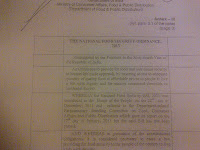Is ordinance route the right way?
Questions
being raised on the Government’s proposed National Food Security Ordinance
June 13, 2013 - Even when the Cabinet is all set to discuss
the approval of the National Food Security Ordinance 2013 in today’s cabinet
meet, Times Now has found out that the populist scheme of the Congress may well
set the agenda for the Party for the 2014 polls. Times Now has an exclusive copy of
the National Food Security Ordinance 2013 which enlists various sops for a
majority of the population. The documents and the cabinet note on food security
that is going to be discussed in today’s meet enlists various schemes for the
poor and the marginalized sections.
In what could be termed as adding political overtones to the
Food Security Ordinance, the Congress justifies the ordinance in the cabinet
note by taking a dig at the opposition for stalling the Food Security Bill in
the previous Parliament session. The note says “We introduced the National Food
Security Bill in the Parliament on each working day since May 2, 2013. But the
bill could not be considered and passed as both houses witnessed frequent
adjournments and disruptions. In such scenario, the Government is of the
considered view that it will not be appropriate to further delay the reaching
of the proposed benefits to the people of the country."
If the present cabinet meet or a future meet approves the
proposed ordinance then the text of the ordinance will be sent to the President
for promulgation. The Government will then introduce a replacement bill in the
next Parliament session and the National Food Security Bill 2011, which is pending
before the Parliament will be withdrawn.
 Some of the highlights of the National Food Security
ordinance are as follows -
Some of the highlights of the National Food Security
ordinance are as follows - 1. 75 per cent of rural population and 50 per cent of urban population will be covered under Targetted PDS system and will get 5 kg subsidized foodgrains per person per month
2. The subsidized rates are 3 rs per kg for rice, 2 rs per kg for wheat and a rupee per kg for coarse grains
3. Pregnant women and lactating mothers will be given meals free of charge during pregnancy and six months after the child birth
4. Every child upto 14 years will get free meals everyday
5. Women of 18 years of age or above to be the head of the household for purpose of issue of ration cards
6. States have to set up internal grievance redressal system
7. State’s have to constitute a State Food Commission to monitor and review the implementation of the ordinance
8. State Government’s expected to implement and monitor the scheme and ensure food security
9. All records to be placed in the public domain to ensure transparency
10. State Governments to set Vigilance Committees
11. Public servants found guilty of not giving the benefits to the citizens will be liable for penalties
12. The Central Govt and State Govts will be liable for a claim by any person entitled in this ordinance if he or she does not get her dues - except in cases of war, flood, drought, fire, cyclone or earthquake affecting the regular supply of food grains
The BJP while opposing the Congress’s ordinance route has
said that there is no need for an ordinance when the existing Food Security
Bill is still pending before the parliament. While the BJP has been quick to
dismiss the proposed ordinance, Congress’s own allies like the NCP has said
that the Food Security scheme needs to be debated in the Parliament and that
the existing project is full of anomalies as it causes a great loss to the
State exchequer and is also too harsh on the farmers. Even Parties like the SP have
hit out at the Congress asking whether or not the Congress is hurrying the
ordinance eying the 2014 elections.
Though the Food Security scheme is definitely a measure
filled with sops for the lesser privileged majority sections of the country,
the question we are asking is if the ordinance route is the only way and
whether is this a genuine attempt by the Congress to appease the masses or a
blatant move to garner votes in the upcoming Loksabha polls.
by Prema Sridevi


Food security bill is a good thamasha ! after ruling for 10 yrs continuously ,the govt. has suddenly thought abt the poor ! Congress again with vote bank politics.
ReplyDelete